Yesterday in Sacramento, Jerry Brown was sworn in, at age 76, for his fourth and final term as governor of our most populous and economically most important state.
Today, in Fresno, he will preside at a symbolic ground-breaking of his major infrastructure project as governor, and the largest one underway anywhere in the country. This is a north-south high-speed rail program that will start construction in the state's hard-pressed Central Valley region and ultimately link the great population centers of the San Francisco Bay Area and the Los Angeles basin.
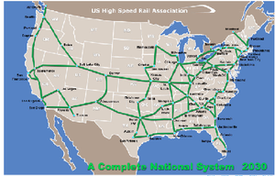
For reasons I described in this 2013 article, I think it's good for California, and good for all Americans' understanding of politics, that Brown has been returned to office for these four last years. For reasons I have laid out in, umm, copious detail, I also think that it is good for the state and the country that this project go ahead. (For the details, see episodes No. 1, No. 2, No. 3, No. 4, No. 5, No. 6, No. 7, No. 8, No. 9, No. 10, No. 11, No. 12, No. 13, No. 14, No. 14 1/2, and No. 14 3/4. Today's item is officially No. 15, and is The End of the Line.)
You can see Brown's inaugural address yesterday via (non-embeddable) C-SPAN video here. If you jump to time 12:20, you'll see an introduction by Brown's wife, Anne Gust Brown (in screen shot below), and get an idea of why she has been considered such an important part of his third- and fourth- term success.
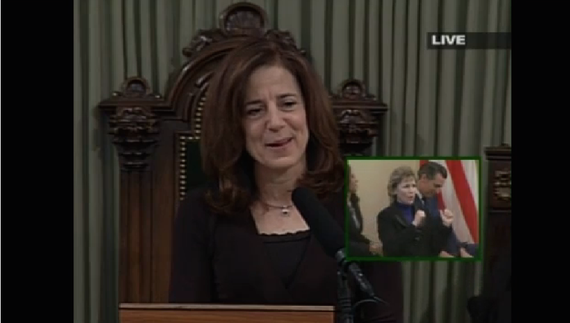
And if you go ahead to roughly time 23:00, you will see Brown talking about his high-speed rail project. It gets a cheer, but to be fair, it's a secondary theme in the speech, which goes in more detail into Brown's plans for education, prison reform, and environmental protection. If you're wondering what it's like to talk with Jerry Brown, the speech as a whole (full text here) will get you started. As I mentioned in my article, the autumnal Governor Brown peppers his formal statements and informal comments with references to his family's many generations in the state, and the state's unusual position in the nation. That's also how he ended this speech:
Whether the early explorers came for gold or God, came they did. The rest is history: the founding of the Missions, the devastation of the native people, the discovery of gold, the coming of the Forty-Niners, the Transcontinental Railroad, the founding of great universities, the planting and harvesting of our vast fields, oil production, movies, the aircraft industry, the first freeways, the State Water Project, aerospace, Silicon Valley and endless new companies and Nobel Prizes.
This is California. And we are her sons and daughters.
Yes, California feeds on change and great undertakings, but the path of wisdom counsels us to ground ourselves and nurture carefully all that we have started. We must build on rock, not sand, so that when the storms come, our house stands. We are at a crossroads. [JF note: This "crossroads" sentence is in vapid contrast with the rest and could have been cut.] With big and important new programs now launched and the budget carefully balanced, the challenge is to build for the future, not steal from it, to live within our means and to keep California ever golden and creative, as our forebears have shown and our descendants would expect.
***
Now, the rail project. Why am I for it? Beyond the details laid out in the previous installments, here are the summary reasons.
1) America is direly short on infrastructure; the financial and political resistance to remedying that is powerful (for reason Mancur Olson once laid out) and usually prevails. China is biased toward wastefully building infrastructure it doesn't need. The U.S. is biased the opposite way. So when there's is a real chance to build something valuable in America, I start out in favor of it.
2) The counties of the Central Valley of California, where the first stages of the construction will begin, are not just the poorest part of a rich state but also, taken on their own, would constitute the poorest state in the entire country. Of the five poorest metro areas in the United States, three are there. Most dynamic analyses of the effects of the rail project indicate that it would bring new jobs to a region that most needs them, while chewing up less farmland than normal sprawl and freeway expansion would destroy. Which leads to ...
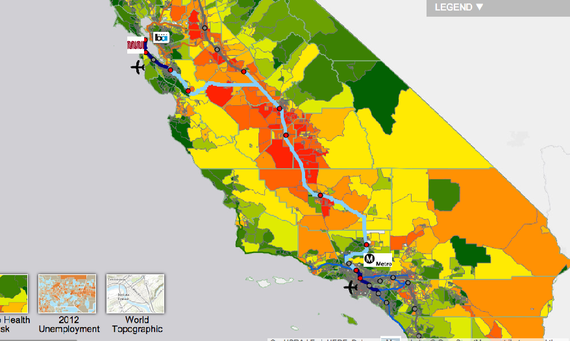
3) The state's population is growing, and so is the demand for intra-state travel. Any other way of getting California's 30+ million people from north to south, via cars on new (or more crowded) freeways or planes to new (or more crowded) airports, will be more destructive of the state's finances, its farmland, and its environment than a rail system.
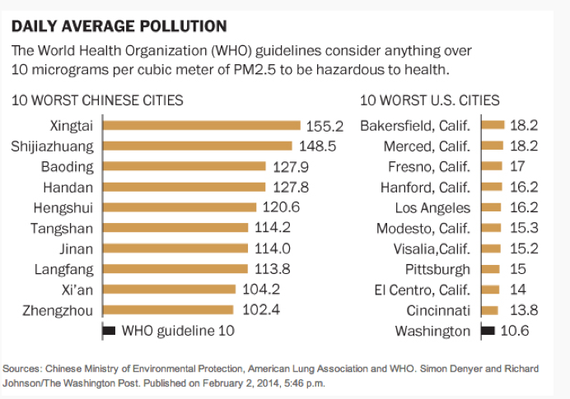
And, maybe the biggest factor of all:
4) There is an established track record of over-estimating the problems of big infrastructure projects, and short-sightedly under-envisioning their benefits. Here's the crucial contrast with big military construction projects I've written about recently. Repeatedly, big military projects have come in over budget, past schedule, and below performance promises.
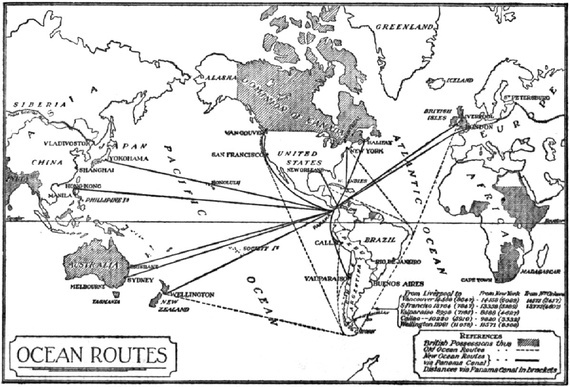
Repeatedly the opposite has been true of big national or regional infrastructure projects. Their drawbacks have been exaggerated before they've been started, and their potential benefit has been grossly under-imagined. Here's a few of the projects that seemed impractical, quixotic, ruinously expensive, or not worth the bother when proposed:
- The Louisiana Purchase
- The Erie Canal
- "Seward's Folly" of buying Alaska
- The transcontinental railroad
- The Panama Canal
- The Golden Gate Bridge, and the Bay Bridge
- The TVA, REA, and WPA, plus Boulder / Hoover Dam
- The expansion of a continental airport system
- The GI Bill
- The Interstate Highway system
- Washington DC's Metro and San Francisco's BART
Details on some of these in the first post in the series.
All of these projects have had their problems. But without any one of them, the United States would be in far worse shape than it is today. High-speed rail also has its problems, and will have more. But the record of big ventures of this sort suggests that we are better at worrying about the problems and noting imperfections than we are at envisioning long-term rewards. Thus I think that the benefit of the doubt should go with the proponents. People on their side have more often been right.
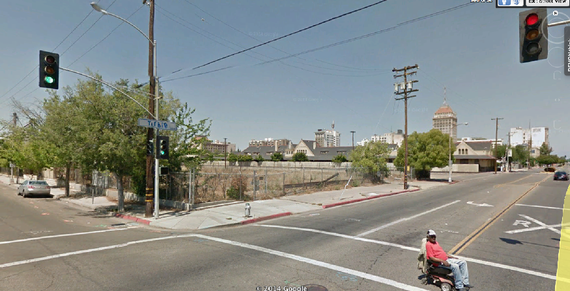
This article was originally published at http://www.theatlantic.com/politics/archive/2015/01/california-high-speed-rail-an-end-and-an-important-beginning/384238/
